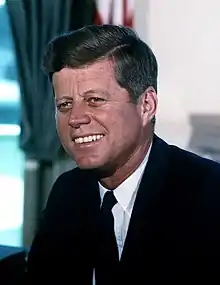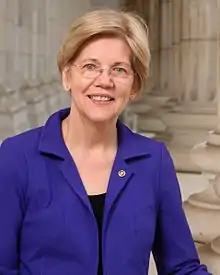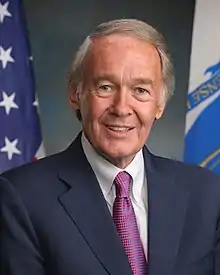Massachusetts Democratic Party
The Massachusetts Democratic Party (MassDems) is the affiliate of the Democratic Party in the Commonwealth of Massachusetts. It is chaired by Gus Bickford[1] and is the state's dominant political party, controlling the entire congressional delegation and veto-proof supermajorities in the state legislature.
Massachusetts Democratic Party | |
|---|---|
 | |
| Chairperson | Gus Bickford |
| Senate leadership | Karen Spilka (President) |
| House leadership | Ronald Mariano (Speaker) |
| Headquarters | Boston, Massachusetts |
| Ideology | Centrism Modern liberalism Progressivism |
| Political position | Center to center-left |
| National affiliation | U.S. Democratic Party |
| Colors | Blue |
| Seats in the U.S. Senate | 2 / 2 |
| Seats in the U.S. House | 9 / 9 |
| Statewide Executive Offices | 4 / 6 |
| Seats in the State Senate | 37 / 40 |
| Seats in the State House | 129 / 160 |
| Website | |
| www.massdems.org | |
Overview
Headquartered in Boston, Massachusetts, the Massachusetts Democratic State Committee is responsible for publicizing the platform of the Massachusetts Democratic Party, the state affiliate of the United States Democratic Party. According to the party charter, the State Committee is charged with conducting state-level campaigns for the Democratic Party, coordinating efforts to fill vacancies in nominating candidates to state and congressional offices, and creating and disseminating information regarding official Democratic Party policies and positions. The Committee also engages in fundraising initiatives to support its operations, and coordinates local caucuses and the Democratic State Conventions.
The State Committee comprises 160 elected members, and add-on and ex officio seats, all of whom must be registered Democrats. Current officers include Gus Bickford, Chairman; Debra Kozikowski, Vice-Chair; Leon Brathwaite, Vice-Chair; Carol Aloisi, Secretary; Paul Yorkis, Treasurer; Thomas McGee, Chair Emeritus; and Veronica Martinez, Executive Director. Non-officers include two men and two women from each state senatorial district, Democratic National Committee members from Massachusetts, and roughly 120 additional committee members comprising various underrepresented minority groups, including veterans, gay and lesbian citizens, and college-aged youth representatives. Democratic statewide officers, Governor's Councilors, US Representatives and Senators, and the top Democrat in each chamber of the state legislature are ex officio members. Any person who has served for twenty years on the state committee remains a member so long as that person remains registered as a Democrat in Massachusetts.
Eighty of the State Committee members (one of each gender per Senate district) must be elected through presidential primary ballots. The other 80 (one of each gender per Senate district) are elected at Senate district conferences by local town and ward committee members. All State Committee members serve four-year terms. There are numerous subcommittees are of the Massachusetts Democratic State Committee, including the Affirmative Action and Outreach Committee, the By-Laws Committee, the Campaign Services Committee, the Charter Amendments Committee, the Communications Committee, the Credentials Committee, the Disability Outreach Committee, the Field Services Committee, the Finance Committee, the LGBT Outreach Committee, the Labor Outreach Committee, the Massachusetts Democratic Latino Caucus Committee, the Public Policy Committee, the Rules Committee, the Rural Committee, the Internship-Scholarship Committee, the Senior Outreach Committee, the Site Selection Committee, the State Judicial Council Committee, the Veterans and Military Families Outreach Committee, the Women's Outreach Committee, and the Youth Services Committee. Subcommittees are chaired by State Committee members.
Affirmative Action Outreach Co-Chairs: Dylan Hayre, Dorothea Jones, Nadeem Mazen
By-Laws Co-Chairs: Jim DiTullio, Teresa Walsh
Campaign Services Co-Chairs: Joe Kaplan, Amanda Smith
Charter Amendments Co-Chairs: Sandi Bagley, Bryan Barash
Communications Co-Chiars: Elaine Almquist, John Bowes
Credentials Co-Chairs: Carol Aloisi, Alana Murphy, Steve Owens
Disability Outreach Co-Chairs: Cheryl Cummings, David Perelman
Field Services Co-Chairs: Jason Palitsch, Karen Payne
JFK Scholarship Co-Chairs: Brenda Braithwaite, Charlotte Golar-Ritchie
Judicial Council: Roger Lau
Labor Outreach Co-Chairs: Ed Collins, Cathy Dwyer
Latino Caucus Co-Chairs: Marcia Cruz Redding, Juan Lopez
LGBT Co-Chairs: Steve Driscoll, Tyler Carlton, Holly Ryan
Personnel Co-Chairs: Andrea Cabral, Mark DiSalvo
Public Policy Co-Chairs: Ralph Edwards, Jamie Eldridge, Martina Jackson, Ann Roosevelt
Resolutions Co-Chairs: Alex Pratt, Marianne Rutter
Resource Development Co-Chairs: Tom Holloway, Nicole LaChapelle
Rules: Bill Eddy
Rural Issues Co-Chairs: Lee Harrison, Lisa Mosczynski
Senior Outreach Co-Chairs: Russ Ashton, Allyne Pecevich
Site Selection Co-Chairs: Sally Rizzo, Ron Valerio
Veterans & Military Families Co-Chairs: Chuck Battle, Christine Tron
Women's Outreach Co-Chairs: Linda Dorcena Forry, Norma Shulman, Megan Costello
Youth Services Co-Chairs: Jeremy Comeau, Alicia Delvento
History

The Massachusetts Democratic Party and the National Democratic Party trace their roots to the latter half of the 18th century, when politicians forged alliances based on common national interests. In 1792, Thomas Jefferson founded the Democratic-Republican Party, commonly referred to as the "party of the common man." Jefferson's new party was adamantly opposed to what it saw as the Federalist Party's elitist agenda. Jefferson served two consecutive terms as the first Democratic Republican President of the United States beginning in 1800. James Madison, another Democratic-Republican, succeeded Jefferson in 1808, followed by fellow party member James Monroe in 1812. The national party was briefly divided during the election of John Quincy Adams in 1824, in which four Democratic candidates ran for office. Andrew Jackson assumed the leadership of the party following this period, and reunified its constituents. Jackson defined the party's platform and established the Democratic National Convention as a means of organizing and implementing the party's agenda on a national scale. With consecutive presidential victories in 1828 and 1832, Jackson succeeded in solidifying the Democratic-Republicans as a powerful national political party. The name was simplified to the Democratic Party at the Democratic National Convention of 1844.
Massachusetts was dominated during the early 19th century by the Federalist Party. The Federalist position was strengthened when Maine, a Democratic-Republican stronghold, achieved statehood in 1820. The Democratic Party in Massachusetts was lacking in well-organized structure and strong leadership for much of the post-Jackson 19th century. Individual factions, including rural groups, immigrants, and factory workers, made up the party rank and file, but were unable to organize effectively to compete with first the Whigs and, after the American Civil War period, the Republicans. They rarely gained control over the legislature, and only one governor (William Russell) served more than two consecutive one-year terms.
As the 19th century was ending, the party found a new strength in an old ideal. The Democrats' long-held suspicions of aristocratic leaders and the wealthy elite struck a chord with immigrants and working class citizens during the first half of the 19th century. Irish Americans gained a measure of organizational power in the party beginning late in the 19th century, but it was not until the 1920s that the Irish, along with other immigrant groups and working-class interests, were able to forge a strong party structure that united their interests and consistently produced electable leadership. By the mid-20th century, the party was successfully contending with Republicans for all major state offices, and had by the 1970s achieved its present dominant position in the state legislature.
20th and 21st centuries
Despite numerous Republicans elected as governor, the Democratic Party was at the forefront of Massachusetts politics for much of the 20th century. Massachusetts Democrats, from John F. Kennedy to Deval Patrick, have played a prominent role in advancing the party's agenda and prominence on a local and national scale. The state's strength as a Democratic stronghold is such that it has not voted for a Republican for president since 1984, when Ronald Reagan was elected.
The 2006 elections solidified the Democratic Party's dominance in Massachusetts, when Deval Patrick became the first Democratic governor in 16 years. It was moderated in 2014 with the election of Republican Charlie Baker as governor. Currently, every Congressional delegate from Massachusetts is a Democrat. Democrats also occupy all constitutional offices in the Commonwealth's state government other than the governor and lieutenant governor (held by Republicans Baker and Karyn Polito), including Attorney General Maura Healey, Auditor Suzanne Bump, Secretary of State William F. Galvin, and Treasurer Deb Goldberg. The party holds super-majorities in both the state House of Representatives and the state Senate.
Current elected officials
Members of Congress
Democrats comprise all of Massachusetts's 11 member Congressional delegation - both US Senators and all 9 member of the House of Representatives.
U.S. Senate
Democrats have controlled both of Massachusetts's seats in the U.S. Senate since 2012:
- Class I: Elizabeth Warren (Senior Senator)
 Senior U.S. Senator Elizabeth Warren
Senior U.S. Senator Elizabeth Warren - Class II: Ed Markey (Junior Senator)
 Junior U.S. Senator Ed Markey
Junior U.S. Senator Ed Markey
U.S. House of Representatives
Out of the 9 seats Massachusetts is apportioned in the U.S. House of Representatives, all 9 are held by Democrats:
Statewide offices
Democrats control four of the six elected statewide offices:
State legislature
- Senate
- Current senators [2]
- Senate President: Karen Spilka (2nd Middlesex and Norfolk district)
- Senate Majority Leader: Cynthia Stone Creem (1st Middlesex and Norfolk)
- House
- Current representatives [3]
- House Speaker: Robert DeLeo (19th Suffolk)
- House Majority Leader: Ronald Mariano (3rd Norfolk)
Mayoral offices
Some of the state's major cities have Democratic mayors. As of 2019, Democrats control the mayor's offices in eight of Massachusetts's ten largest cities:
- Boston (1): Marty Walsh
- Worcester (2): Joseph Petty
- Springfield (3): Domenic Sarno
- Lowell (4): William Samaras
- Cambridge (5): Sumbul Siddiqui
- New Bedford (6): Jonathan F. Mitchell
- Lynn (9): Thomas M. McGee
- Fall River (10): Paul Coogan
Past elected officials
U.S. Presidents
- John F. Kennedy (1961–63)
U.S. Senators
- Robert Rantoul Jr. (1851)
- David I. Walsh (1919–25, 1926–47)
- Marcus Coolidge (1931–37)
- John F. Kennedy (1953–60)
- Benjamin A. Smith II (1960–62)
- Ted Kennedy (1962–2009)
- Paul Tsongas (1979–85)
- John Kerry (1985–2013)
- Paul G. Kirk (2009–10)
- Mo Cowan (2013)
before 1874
- Francis Baylies of Taunton (1821–27)
- Gayton P. Osgood (1833–35)
- Nathaniel B. Borden of Fall River (1835–39)
- William Parmenter of Cambridge (1837–45)
- Henry Williams (1839–41, 1843–45)
- Robert Rantoul Jr. of Beverly (1851–52)
- Edward P. Little (1852–53)
- Nathaniel P. Banks of Waltham (1853–55)[lower-alpha 1]
1875–1899
- Chester W. Chapin of Springfield (1875–77)
- John K. Tarbox of Lawrence (1875–77)
- Charles Perkins Thompson of Gloucester (1875–77)
- William Wirt Warren of Boston (1875–77)
- Josiah Gardner Abbott of Boston (1876–77)
- Leopold Morse of Boston (1877–85, 1887–89)
- Benjamin Dean of Boston (1878–79)
- Patrick A. Collins of Boston (1883–89)
- Henry B. Lovering of Lynn (1883–87)
- Edward Burnett of Upton (1887–89)
- John E. Russell of Leicester (1887–89)
- John F. Andrew of Boston (1889–93)
- Joseph H. O'Neil of Boston (1889–95)
- Frederick S. Coolidge of Westminster (1891–93)
- John Crawford Crosby of Pittsfield (1891–93)
- Sherman Hoar of Waltham (1891–93)
- Moses T. Stephens of North Andover (1891–95)
- William Everett of Quincy (1893–95)
- John F. Fitzgerald of Boston (1895–1901, 1919)
- Henry F. Naphen of Boston (1899–1903)
- John R. Thayer of Worcester (1899–1905)
1900–1924
- Joseph A. Conry of Boston (1901–03)
- John A. Keliher of Boston (1903–11)
- William S. McNary of Boston (1903–07)
- John Andrew Sullivan of Boston (1903–07)
- Joseph F. O'Connell of Boston (1907–11)
- Andrew J. Peters of Boston (1907–14)
- Eugene Foss of Jamaica Plain (1910–11)
- John Joseph Mitchell of Marlboro (1910–11, 1913–15)
- James Michael Curley of Boston (1911–14, 1943–47)
- William Francis Murray of Boston (1911–14)
- John A. Thayer of Worcester (1911–13)
- Frederick Simpson Deitrick of Cambridge (1913–15)
- Edward Gilmore of Brockton (1913–15)
- Michael Francis Phelan of Lawrence (1913–21)
- Thomas Chandler Thacher of Yarmouth (1913–15)
- James A. Gallivan of Boston (1914–28)
- Richard Olney II of Dedham (1915–21)
- Peter Francis Tague of Boston (1915–19, 1919–25)
- William P. Connery Jr. of Lynn (1923–37)
1925–1949
- John J. Douglass of Boston (1925–35)
- John W. McCormack of Boston (1928–71)
- William J. Granfield of Springfield (1930–37)
- Arthur D. Healey of Somerville (1933–42)
- Joseph E. Casey of Cambridge (1935–43)
- John P. Higgins of Boston (1935–37)
- Richard M. Russell of Cambridge 1935–37)
- Lawrence J. Connery of Lynn (1937–41)
- Thomas A. Flaherty of Charlestown (1937–43)
- Thomas H. Eliot of Cambridge (1941–43)
- Thomas J. Lane of North Andover (1941–63)
- Philip J. Philbin of Clinton (1943–71)
- Harold Donohue of Worcester (1947–74)
- John F. Kennedy of Cambridge (1947–53)
- Foster Furcolo of Springfield (1949–52)
1950–1974
- Edward Boland of Springfield (1953–89)
- Tip O'Neill of Cambridge (1953–87)
- Torbert H. Macdonald of Malden (1955–76)
- James A. Burke of Milton (1959–79)
- Michael J. Harrington of Salem (1969–79)
- Rev. Robert Drinan of Newton (1971–81)
- Louise Day Hicks of South Boston (1971–73)
- John J. Moakley of Boston (1973–2001)
- Gerry Studds of Cohasset (1973–97)
1975–1999
- Joseph D. Early of Worcester (1975–93)
- Paul Tsongas of Lowell (1975–79)
- Ed Markey of Malden (1976–2013)
- Brian J. Donnelly of Dorchester (1979–93)
- Nicholas Mavroules of Peabody (1979–93)
- James Shannon of Lowell (1979–85)
- Barney Frank of Newton (1981–2013)
- Chester G. Atkins of Concord (1985–93)
- Joseph P. Kennedy II of Boston (1987–99)
- John Olver of Amherst (1991–2013)
- Marty Meehan of Lowell (1993–2007)
- William Delahunt of Quincy (1997–2011)
- John F. Tierney of Salem (1997–2015)
- Mike Capuano of Somerville (1999–2019)
- Niki Tsongas of Lowell (2007–2019)
Governors
- Marcus Morton (1840–41, 1843–44)
- George S. Boutwell (1851–53)
- William Gaston (1875–76)
- Benjamin F. Butler (1883–84)
- William F. Russell (1891–94)
- William L. Douglas (1905–06)
- Eugene Noble Foss (1911–14)
- David I. Walsh (1914–16)
- Joseph B. Ely (1931–35)
- James Michael Curley (1935–37)
- Charles F. Hurley (1937–39)
- Maurice J. Tobin (1945–47)
- Paul A. Dever (1949–53)
- Foster Furcolo (1957–61)
- Endicott Peabody (1963–65)
- Michael Dukakis (1975–79, 1983–91)
- Edward J. King (1979–83)
- Deval Patrick (2007–15)
State legislature
Attorney General
- Thomas J. Boynton (1914–15)
- Paul A. Dever (1935–41)
- Francis E. Kelly (1949–53)
- Edward J. McCormack Jr. (1958–63)
- Robert H. Quinn (1969–75)
- Francis X. Bellotti (1975–87)
- James Shannon (1987–91)
- Scott Harshbarger (1991–99)
- Thomas Reilly (1999–2007)
- Martha Coakley (2007–15)
Treasurer
- Frederick Mansfield (1914–15)
- Charles F. Hurley (1931–37)
- Francis X. Hurley (1943–45)
- John E. Hurley (1945–47, 1949–52)
- Foster Furcolo (1952–55)
- John Francis Kennedy (1955–61)
- John T. Driscoll (1961–64)
- Robert Q. Crane (1964–91)
- Shannon P. O'Brien (1999–2003)
- Tim Cahill (2003–09)[lower-alpha 2]
- Steve Grossman (2011–15)
Secretary of the Commonwealth
- Frank J. Donahue (1913–15)
- Edward J. Cronin (1949–58)
- Joseph D. Ward (1959–61)
- Kevin H. White (1961–67)
- John Davoren (1967–74)
- Paul H. Guzzi (1975–78)
- Michael J. Connolly (1979–94)
Auditor
- William D. T. Trefry (1891–92)
- Frank H. Pope (1914–15)
- Francis X. Hurley (1931–35)
- Thomas H. Buckley (1935–39)
- Thomas J. Buckley (1941–64)
- Thaddeus M. Buczko (1964–81)
- John J. Finnegan (1981–87)
- A. Joseph DeNucci (1987–2011)
List of party chairmen
- George S. Boutwell (1853)
- Noah A. Plympton (1883–1884)
- Patrick Collins (1884–1891)
- John W. Corcoran (1891)
- Josiah Quincy (1891–1894)[4]
- John W. Corcoran (1894–1896)
- John W. Coughlin (1896–1898)
- Christopher T. Callahan (1898–1901)
- William S. McNary (1901–1904)
- John Flaherty (1904–1905)
- Josiah Quincy (1905–1906)
- John P. Feeney (1906–1908)
- James W. Synan (1908–1909)
- John F. McDonald (1909–1912)
- Thomas P. Riley (1912–1914)
- Michael A. O'Leary (1914–1921)
- Arthur Lyman (1921–1923)
- Charles H. McGlue (1923–1928)
- Frank J. Donahue (1928–1932)
- Charles F. Riordon - Acting (1932)
- Joseph A. Maynard (1932–1934)
- Helen McGillicuddy - Acting (1934)
- Charles H. McGlue (1934–1935)
- Joseph McGrath (1935–1939)
- William H. Burke, Jr. (1939–1944)
- John F. Cahill (1944–1948)
- John T. McMorrow (1948)
- William Brophy - Acting (1948–1949)
- James H. Vahey Jr. (1949)
- Edward P. Gilgun - Acting (1949)
- John C. Carr (1949–1956)
- William H. Burke, Jr. (1956)
- John M. "Pat" Lynch (1956–1962)
- Gerard F. Doherty (1962–1967)
- Lester Hyman (1967–1968)
- David E. Harrison (1968–1971)
- Robert Q. Crane (1971)
- Charles Flaherty (1971–1977)
- Chester G. Atkins (1977–1991)
- Steve Grossman (1991–1993)
- Joan Menard (1993–2000)
- Philip W. Johnston (2000–2007)
- John E. Walsh (2007–2013)
- Thomas McGee (2013–2016)
- Gus Bickford (2016–present)
See also
References
- "Bickford elected new state Democratic Party chairman". Boston Globe.
- "Senate Members: Democrats", malegislature.gov, retrieved August 8, 2020
- "House Members: Democrats", malegislature.gov, retrieved August 8, 2020
- Political Points: The Official Vote of the State of Massachusetts. Boston: M.J. Kiley. 1891 – via HathiTrust.
Notes
- Banks left the Democratic Party in 1855, but served several nonconsecutive terms in Congress until 1891 as a Know-Nothing and Republican.
- Cahill left the Democratic Party in 2009, but remained Treasurer until 2011.
Further reading
- Abrams, Richard M. Conservatism in a Progressive Era: Massachusetts Politics 1900-1912. Cambridge, Massachusetts: Harvard University Press, 1964
- Brown, Richard D. Massachusetts: A Bicentennial History. New York: W.W. Norton & Company, Inc., 1978
- Darling, Arthur B. Jacksonian Democracy in Massachusetts. The American Historical Review, Vol. 29, No.2. (Jan, 1924), pp. 271–287
- Gamm, Gerald H. The Making of the New Deal Democrats: Voting Behavior and Realignment in Boston, 1920-1940. Chicago: University of Chicago Press, 1989
- Goodman, Paul. The Democratic-Republicans of Massachusetts: Politics in a Young Republic. Cambridge, Massachusetts: Harvard University Press, 1964
- Hennessy, Michael E. Four Decades of Massachusetts Politics: 1890-1935. Norwood, Mass.: The Norwood Press, 1935
- Merriam, C.E. State Central Committees: A Study of Party Organization. Political Science Quarterly, Vol. 19, No. 2. (June, 1904), pp. 224–233.
- Robinson, William A. Jeffersonian Democracy in New England. New Haven, Conn.: Yale University Press, 1916.